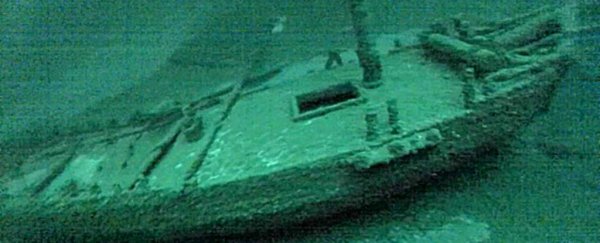Three retirees who spend their time hunting shipwrecks have discovered the remains of an 18th-century trading vessel called the Washington at the bottom of Lake Ontario.
The 200-year-old ship is surprisingly well preserved, with its mast still standing, and is the second oldest shipwreck to ever be found in the Great Lakes - providing insight into an important time period for the region.
The Washington was a 16-metre (53-foot) sloop - or one-masted sailing boat - that sunk during a storm in November 1803, leaving no survivors.
Although there are detailed records left behind of its trade routes, the wreckage had never been found before, and archaeologists had no idea what type of condition it would be in.
But a team from upstate New York - diver Jim Kennard, pilot Roger Pawlowski, and architect Chip Stevens - decided to look for it themselves.
Since retiring, the trio has transformed into an avid shipwreck hunting group, running the site Shipwreck World, and going out hunting for sunken treasures 15 to 20 times a year.
Kennard alone has found more than 200 lost vessels since the 1970s.
 Jim Kennard
Jim Kennard
In June, the team used sonar (image above) to scan the deep waters off the coast of Oswego on the US side of the lake, when they spotted what looked like a boat.
They then deployed a camera-toting remote-operated vehicle a few weeks later to check out the find, and you can see the footage captured below:
"You never know what you're going to find when you find a shipwreck like this because some of them really get damaged, very much so in a storm. But it's pretty much all there. The mast is still standing," Kennard told Canadian news network CTV.
The team suggests this is because the boat went down stern-first, and settled in such deep water that the temperature surrounding it is only around 4 degrees Celsius (39 degrees Fahrenheit), with low oxygen content so the wood decayed very slowly.
Although it's not the oldest wreck ever found in the Great Lakes, it's believed to be the oldest confirmed commercial sailing ship to exist there, which is one of the reasons why the find is so important for archaeologists.
There was on a small window of time during which sloops were serving as trading vessels in the region - they were soon replaced by schooners, which have two or more masts.
The boat also went down in the period between the American Revolutionary War, which ended in 1783, and the War of 1812 - a time from which archaeologists have found very few wreckages, and still know little about.
"It just gives us a better understanding of what life on the Great Lakes was like at such an early time," Carrie Sowden, archaeological director at the National Museum of the Great Lakes, told the Wall Street Journal.
Archaeologists will now continue to analyse the wreckage, but the shipwreck hunting team are keeping the precise location - including the sloop's depth and distance from the shore - a secret, to avoid people scavenging the boat.
We can't wait to find out more of its secrets. You can see a watercolour painting of the Washington in all its glory below:
 Roland Stevens
Roland Stevens
